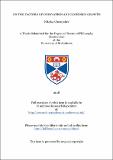Files in this item
On the factors of innovation and economic growth
Item metadata
| dc.contributor.advisor | Trew, Alex | |
| dc.contributor.advisor | Knowles, Matthew Paul | |
| dc.contributor.author | Chernyshev, Nikolay | |
| dc.coverage.spatial | xiii, 156 p. | en_US |
| dc.date.accessioned | 2019-10-04T10:39:41Z | |
| dc.date.available | 2019-10-04T10:39:41Z | |
| dc.date.issued | 2018-12-06 | |
| dc.identifier.uri | https://hdl.handle.net/10023/18608 | |
| dc.description.abstract | One could hardly overstate the importance of economic growth and innovation as the engine of continuous improvement in the quality of life and wellbeing. This dissertation seeks to improve our understanding of factors impacting on economic growth and the process of innovating. Chapter 1 underscores that exploring the relationship between competition and innovation requires consistency in the way innovation is measured and proxied. It shows that a failure to do so can lead to conflicting conclusions on how competition affects innovation. Chapter 2 explores the literature on the relationship between business cycles and innovation to argue that existing evidence is conflicting and implies that research and development (R&D) activities respond positively to downturns at the level of individual firms (i.e. are countercyclical) but negatively at that of sectors and economies (i.e. are procyclical). The chapter explains this regularity through the procyclicality of fluctuations in the number of R&D performers, which offsets the countercyclicality of individual R&D profiles and makes it look procyclical at the aggregate level. Chapter 3 documents and analyses the positive link between the strength of intersectoral connections within an economy, and its growth. To explain this regularity, it develops a tractable theoretical framework whereby tighter connections bring about stronger propagation downstream of productivity growth episodes in individual firms and sectors. Analysing the framework yields stark testable predictions on the most growth-enhancing structure of the intersectoral linkage. | en_US |
| dc.description.sponsorship | "I would like to thank the University of St Andrews and the donors of the Santander 600 Scholarship for their generous financial support throughout my study." -- Acknowledgements | en |
| dc.language.iso | en | en_US |
| dc.publisher | University of St Andrews | |
| dc.subject.lcc | HD75.C54 | |
| dc.subject.lcsh | Economic development | en |
| dc.subject.lcsh | Endogenous growth (Economics) | en |
| dc.subject.lcsh | Technological innovations--Economic aspects | en |
| dc.subject.lcsh | Business cycles | en |
| dc.subject.lcsh | Competition | en |
| dc.title | On the factors of innovation and economic growth | en_US |
| dc.type | Thesis | en_US |
| dc.contributor.sponsor | University of St Andrews. 600th Anniversary Scholarship | en_US |
| dc.contributor.sponsor | Santander UK | en_US |
| dc.type.qualificationlevel | Doctoral | en_US |
| dc.type.qualificationname | PhD Doctor of Philosophy | en_US |
| dc.publisher.institution | The University of St Andrews | en_US |
This item appears in the following Collection(s)
Items in the St Andrews Research Repository are protected by copyright, with all rights reserved, unless otherwise indicated.

